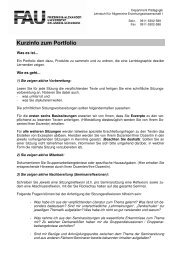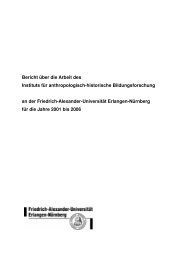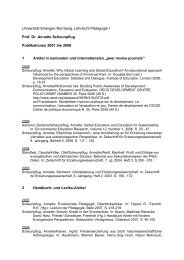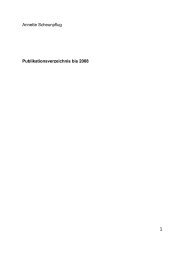Seite 10<strong>ZEP</strong>30. Jg. Heft 1 März 2007gaben an, dass sie bereichernde Erfahrungen beim Aktionstaggemacht haben. Mehrere Personen teilten mit, dass sie durch denTag erfahren haben, wer sich auf dem Campus mit globalen Fragenbefasst, dass sie neue Informationen erhalten haben oder Kontaktepflegen konnten. 34 % der Befragten, die am Aktionstag teilnahmen,haben durch ‚Campus Global‘ neue Anregungen zum Engagementbekommen, z.B. in Bezug auf bestimmte studentische Initiativenoder das Thema „Fairer Handel“. Von 14 % der Befragten wurdeder Aktionstag insgesamt als sehr gut, von 64 % als gut bewertet. 22% haben ihn als mittelmäßig oder schlecht empfunden.An der Gruppendiskussion beteiligten sich sechs Personen, die ander Organisation des Aktionstages mitgewirkt haben. 5 Mit dem Taginsgesamt waren die Beteiligten zufrieden. Als größter Erfolg wurdeallerdings nicht der Tag selbst, sondern die durch die Vorbereitungund Durchführung von ‚Campus Global‘ erfolgte Vernetzung derverschiedenen Akteure und Initiativen, die sich mit globalen Fragenbefassen, angesehen. Durch die Vielzahl der Beteiligten sei es außerdemgelungen, während des Aktionstages deutlich zu machen,dass sich sehr verschiedene Gruppen an der Universität mit globalenFragen beschäftigen. Nicht zuletzt sei es auch gelungen, durch denAktionstag für die Bedeutung globaler Fragen an der UniversitätAufmerksamkeit zu schaffen und Gestaltungsmöglichkeiten aufzuzeigen.Kaum gelungen sei es allerdings, globale Wirkungszusammenhängedeutlich zu machen. Als besonders wurde am Aktionstaggewertet, dass es gelungen sei, Akteure einzubinden, die sich nichtschwerpunktmäßig Fragen von Nachhaltigkeit und Globalität widmen,z.B. der Hochschulsport oder das Fremdsprachenzentrum. Diean der Gruppendiskussion beteiligten Personen waren sich einig,dass sie das entstandene Netzwerk gerne für weitere gemeinsameAktivitäten nutzen würden; möglicherweise könnte der Aktionstagauch im nächsten Jahr wiederholt werden.Zusammenfassend kann bilanziert werden, dass der Aktionstagauf gute Resonanz an der Universität gestoßen ist und durch dengemeinsamen Vorbereitungsprozess an der Universität Lüneburgein Netzwerk von Akteuren entstanden ist, die sich alle mit globalenFragen auseinandersetzen, aber vorher nicht in dieser Formzusammengearbeitet haben. Zudem konnten Gruppen und Personeneingebunden werden, die sich in ihrer Arbeit sonst höchstens amRande mit solchen Themen befassen. Den Teilnehmenden konntedurch ‚Campus Global‘ deutlich gemacht werden, welche Vielzahlan Initiativen sich an der Universität Lüneburg im Bereich ‚Nachhaltigkeitund Globalität‘ engagiert und welche Möglichkeiten es gibt,sich selbst – an der Universität – im Sinne einer globalen nachhaltigenEntwicklung einzubringen. Das entstandene Netzwerk kanneine Basis zur Initiierung weiterer Prozesse gemeinsamen GlobalenLernens in der Lebenswelt Hochschule sein.Schlussfolgerungen und KonsequenzenDer Aktionstag ‚Campus Global‘ hat im Sinne einer Messe Akteureund Initiativen zusammengeführt, die sich für Nachhaltigkeitund globale Gerechtigkeit engagieren. Es konnten verschiedeneinformelle Settings sichtbar gemacht werden, die an der UniversitätLüneburg Globales Lernen und Handeln ermöglichen. Es wurdenSettings erkennbar, die auch sonst bestehen, aber längst nicht allenAngehörigen der Hochschule bekannt sind (z.B. die studentischenInitiativen); und durch den Aktionstag selbst (inkl. des Vorbereitungsprozesses)informelle Settings geschaffen, die Räume für GlobalesLernen eröffnet haben: z.B. das internationale Essen in den Cafés,Torschießen mit fairen Fußbällen oder Sprachen-Schnupperkurse.Mit den dargestellten Aktivitäten konnte beispielhaft gezeigt werden,welche Potentiale informelle Settings an Hochschulen, also dieLebenswelt Hochschule, neben der (formalen) Lehre für GlobalesLernen bieten. Diese Potentiale sind bisher noch völlig unzureichenduntersucht worden, da in Bezug auf Bildungsinstitutionen vorrangigdie formalen Lernprozesse in den Blick genommen werden. DasProjekt ‚Lebenswelt Hochschule‘ wird sich weiter mit der Fragebefassen, wie informelle Settings an Hochschulen für die Bildung füreine nachhaltige Entwicklung/Globales Lernen genutzt und sinnvollmit formalen Settings verknüpft werden können.Anmerkungen1 Unter anderem wurden folgende Maßnahmen im Rahmen des Projekts ‚Agenda21 und Universität Lüneburg‘ umgesetzt: Interdisziplinäres Studienprogramm‚Nachhaltigkeit‘, Agenda-Bibliothek, Umweltmanagementsystem, Campus-Cafémit fair gehandelten und ökologischen Produkten, Zeitung zu Nachhaltigkeit aufdem Campus.2 Adressaten der Befragung waren alle 11.000 Mitglieder der Universität Lüneburg.Mit 2.110 ausgefüllten Fragebögen konnte ein Rücklauf von 19,1 % erreicht werden.Die Datenauswertung erfolgte mittels der Software SPSS.3 Die Befragung weist keine Repräsentativität für die Gesamt-Universität auf; eskonnten aber Angehörige aller Fachbereiche am Campus Scharnhorststraße, andem der Aktionstag stattfand, erreicht werden. Die Angehörigen der Kultur- undUmweltwissenschaften sind allerdings überrepräsentiert und die <strong>Erziehungswissenschaft</strong>enund die Wirtschafts- und Sozialwissenschaften unterrepräsentiert. Frauensind leicht überrepräsentiert.4 Da Mehrfachnennungen möglich waren, ergeben die %-Angaben in der Summemehr als 100%. Aufgeführt sind nur die am häufigsten genannten Aktivitäten.5 Folgende Akteure/Institutionen waren durch jeweils eine Person vertreten: Dachverbandder Studierendeninitiativen, amnesty-Hochschulgruppe, SNEEP (StudentischesNetzwerk für Wirtschafts- und Unternehmensethik), Campus ManagementGmbH (Serviceanbieter, der u.a. die Cafés auf dem Campus betreibt), Centre forSustainable Management und Projekt ‚Sustainable University‘.LiteraturAdomßent, M./Godemann, J./Michelsen, G. (2005) : Hochschule(n) und das Leitbildder Nachhaltigkeit: Herausforderungen und Stand der Umsetzung in Deutschland.In: <strong>ZEP</strong> – Zeitschrift für internationale Bildungsforschung und Entwicklungspädagogik28. Jg., H. 3, S. 20 – 26.de Haan, G. (2004): Politische Bildung für Nachhaltigkeit. In: Aus Politik undZeitgeschichte Bd. 7-8, S. 39 – 46.Michelsen, G. (2002): Higher education and sustainable development in Germany:The example of the University of Lüneburg. In: van Dam-Mieras, R./Michelsen,G./u.a. (Hg): COPERNICUS in Lüneburg. Higher Education in the Context ofSustainable Development and Globalization. Frankfurt a. M., S. 120 – 133.Greverus, I.-M. (1987): Kultur und Alltagswelt. Eine Einführung in Fragen derKulturanthropologie. Frankfurt a. M.Overwien, B. (2001): Debatten, Begriffsbestimmungen und Forschungsansätzezum informellen Lernen und zum Erfahrungslernen. In: Senatsverwaltung fürArbeit, Soziales und Frauen: Tagungsband zum Kongress “Der flexible Mensch”.Berlin, S. 359 – 376.Overwien, B. (2005): Stichwort: Informelles Lernen. In: Zeitschrift für <strong>Erziehungswissenschaft</strong>H. 4, S. 338 – 353.Newport, D./Chesness, J.L./Linder, A. (2003): The ‘environmental sustainability’problem. In: International Journal of Sustainability in Higher Education 4. Jg.,H. 4,S. 357 – 363.Schütz, A./Luckmann, T. (1991): Strukturen der Lebenswelt. Bd 1. Frankfurt a. M.Siebert, H. (1985): IV. Ökologie verstehen und ökologisch leben. In: Michelsen,G./Siebert, H.: Ökologie lernen. Anleitungen zu einem veränderten Umgang mitNatur. Frankfurt a. M., S. 58 – 75.Winkelmann, H.-P. (2005): Hochschule und nachhaltige Entwicklung. In: Michelsen,G./Godemann, J. (Hg): Handbuch Nachhaltigkeitskommunikation. Grundlagenund Praxis. München, S. 809 – 818.Marco Rieckmann, Wissenschaftlicher Mitarbeiter am Institut für Umweltkommunikationder Universität Lüneburg; Arbeitsschwerpunkte: Bildung für eine nachhaltigeEntwicklung; Globales Lernen; Nachhaltigkeit im universitären Kontext; das Leitbildder Nachhaltigkeit und die Lokale Agenda 21 im Nord-Süd-Dialog; Entwicklungstheorienund -politik.
<strong>ZEP</strong>30. Jg. Heft 1 März 2007 Seite 11Doug BournAcademic Support andUnderstanding of DevelopmentEducationZusammenfassung: Der Beitrag leistet zunächst eineBestandsaufnahme der Beschäftigung mit Globalem Lernenbzw. entwicklungspolitischer Bildung im wissenschaftlichenKontext vor und kommt dabei zu dem Ergebnis, dass es zwarim englisch-sprachigen Bereich einige Wissenschaftler undWissenschaftlerinnen gibt, die sich mit diesem Arbeitsbereichbefassen, dass das Thema aber keinen Eingang in denMainstream der erziehungswissenschaftlichen Debattengefunden hat. Ausgehend davon werden die Zielsetzung unddie Forschungsagenda des Research Centre on DevelopementEducation (London-University, Intstitute of Education)dargestellt.Abstract: First of all, this article gives an inventorycontrol of employment with global learning resp. politicaldevelopment education in a scientifi c context with the resultthat there do exist English-speaking scientists that deal withthat working area, but that the subject hasn’t found entry tothe paedagogical mainstream debates. Proceeding from that,the objective target and the research agenda of the ResearchCentre on Development Education (London-University, Instituteof Education) are formed.Development Education and HigherEducationDevelopment education and its related terms of globaleducation and global learning are becoming increasinglywell supported by governments, policy-makers and nongovernmentalorganisations (NGOs) across Europe. Butmost of this activity has been based around the practice ofa range of NGOs. There has been some increasing activitywithin higher education in recent years linked mainly toinfluencing the training of teachers or deepening the studyof development issues across a range of degree courses. Butthere has been no independent body of educational researchin development education.In the UK for example there is a growing network ofacademics interested in development education and globalperspectives. There are a number of institutions that havedeveloped, or are considering initiatives, research centres orprogrammes that relate to global learning. There are researchcentres in areas that link to development education, includinga Centre for Human Rights Education at Roehampton Universityand one on Sustainable Development at PlymouthUniversity. There are a number of individuals and universitieswho have undertaken and are undertaking research under theheading of ‘global education’, including Bath Spa, Leeds,York, Bristol, Leicester and Exeter Universities (Hicks/Scott-Baumann/Clough/Holden 2003). But there is no centre oflearning that has focused specifically on the ‘internationaldevelopment’ aspects of education.These trends are mirrored across Europe, although thereare a number of courses and research groups at a number ofuniversities, including University of Erlangen-Nuremberg,Vienna, Warsaw and Dublin.The consequence of this lack of independent researchfocus on development education is that it has minimal academicprofile. There is for example no academic journal fordevelopment or global education, unlike areas such as environmentaleducation or citizenship education. Where therehas been research, such as Osler and Vincent, it has beenlooking at the relationship of global education to topics suchas citizenship (Osler/Vincent 2004). There have however beena number of conferences in recent years that have begun theprocess of engaging in debates on development and globaleducation and their relationship to learning in a global society(O’Loughlin/Wegimont 2002; 2003).Policy-Makers and Request forEvidenceThe growth in political and educational support for developmenteducation and global perspectives has posed theneed for evidence to justify the value of the funding and itsrelevance. Development education throughout the 1980s and1990s across many countries suffered from being susceptibleto moods and changes in policies from governments.Elections of social democrat led governments often led toincreased resources whilst conservative led governmentsled to reduction in funding (Bourn 2003; Cronkhite 2000;McCollum 1996; Marshall 2005).Since 2000 there has been an increased support across thepolitical spectrum for development education but in mostcountries, funders have increasingly posed the need for
















